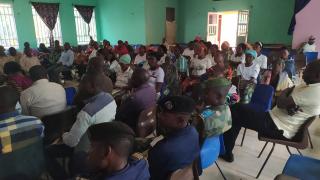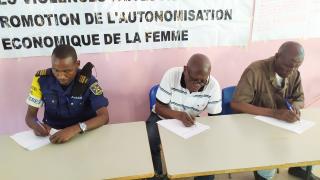Changing social norms one conversation at a time
Community Forums in the Democratic Republic of Congo
In eastern Democratic Republic of the Congo (DRC), 120 graduates of our year-long training programme have been trained as ‘Change Agents’ - advocates for women and girls in their communities, who are leading efforts to combat violence against women and improve women’s economic participation. Change Agents work in groups within their village, identifying the key barriers facing women and advocating for change.
We saw in the previous blog in this series how unregistered marriage is a major barrier to women in eastern DRC, depriving them of legal protections enshrined under national law, and leaving them vulnerable to harmful and discriminatory patriarchal customs – including early and forced marriage, polygamous unions, and women’s exclusion from owning land.
Change Agents are working within their communities to raise awareness of these of negative effects, and to promote civil marriage as a means for women to access vital legal safeguards that will make them less vulnerable to poverty and violence.
Yet Change Agents recognise that laws alone are not enough to stamp out unequal and discriminatory practices. It is also necessary to change underlying attitudes about gender, which view women and girls as “property” rather than individuals with rights and potential.

Involving men in the conversation
Creating change in Kamanyola

- Issuing formal instructions to village chiefs to involve women in decision-making meetings on inheritance after the death of a relative
- Setting up a group to ensure the inclusion of girls in written wills
- Making efforts to appoint women into local administrative roles and select women as candidates for local elections
Impact of community forums
Over the next few months, Change Agents will be meeting with representatives of each of the signatories, and gathering feedback from local women’s networks, to evaluate the implementation of their commitments.
Sikitu is one of the Change Agents in Kamanyola who organised the forum and is in charge of holding the leaders accountable. Since graduating from our year-long programme, she has set up her own business and is now earning an income for the first time. When asked about what she took from the training, Sikitu looks beyond the individual economic benefits:
I can say with confidence that I know what to do, where to go and how to claim my rights if they are violated – that is what motivated me to join the Change Agents Programme; I wanted to empower other women in the same way
